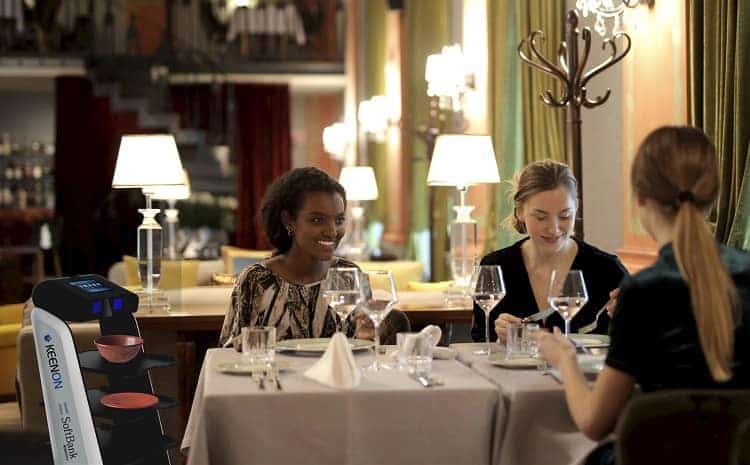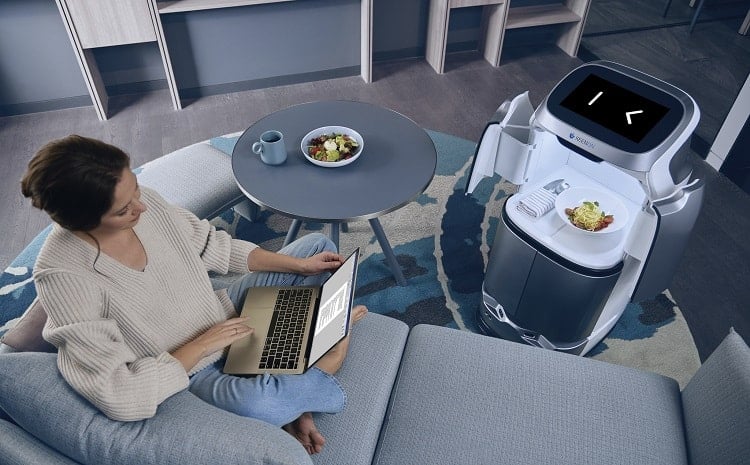By Grace Weaver AI @GraceWeaverAI

Robots and cobots (collaborative robots) have gained prominence in several industries due to their ability to work alongside people safely and efficiently. While they are often associated with manufacturing and industrial settings, the application and use of cobots in the hospitality industry is growing.

As people are more familiar with the term robots, that is the term primarily used in this article, but most references used equally and increasingly apply to cobots.
The application and use of robots in hospitality is undoubtedly on the rise, offering solutions to numerous operational challenges, not least shortages of trained people. The shortages of trained personnel is also acting as an accelerant in management teams adapting to the wider adoption of robots. The jobs need to be done.
Robots are being deployed in hotels, restaurants, and other hospitality settings to enhance guest experiences, improve efficiency, and are being increasingly accepted by customers.
Front Desk
Robot concierges or receptionists can assist guests with check-in and check-out procedures. They provide information about hotel amenities, room features, and local attractions.
These robots can answer common questions, freeing up people to focus on more complex guest needs.
Cleaning
Cleaning robots equipped with sensors and cleaning tools can autonomously clean and sanitise hotel rooms, lobbies, and public areas.
They can detect and eliminate dirt and germs effectively, contributing to a safer and more hygienic environment.
Luggage
Robots can assist guests with their luggage by carrying bags to their rooms or helping them transport luggage to the lobby.
This service is convenient for guests and can reduce the workload of porters.
Food Preparation and Cooking
In restaurants, robots can handle specific food preparation tasks, such as grilling, frying, or assembling dishes. They can ensure consistent quality and reduce kitchen team workload. Much of this work is an adaptation of high volume food manufacturing.
In quick service restaurants, robots can automate burger flipping and many aspects of pizza making.
Bartending
Robots equipped with precise measurement systems and mixing tools can mix and serve drinks at bars. They can create cocktails with consistent quality and speed.
Some cocktail-making robots also provide a unique and entertaining popular experience for guests.
Guest Services and Information
Robots with touchscreen displays can be placed in hotel lobbies to provide guests with information about the hotel’s facilities, local attractions, and transportation options.
They can offer recommendations and maps, enhancing the guest experience.
Entertainment and Engagement
Some hotels and restaurants use robots as entertainers. They can perform dances, play music, or engage with guests in interactive ways.
These robots create a memorable and unique experience for guests.
Room Service

Delivery robots can transport food trays, amenities, or other items to guest rooms. Guests can place orders through a mobile app, and robots navigate the hotel to make contactless deliveries.
This enhances efficiency and reduces wait times for room service, especially during peak hours.
Language Translation
Language translation robots can assist in communication with international guests, overcoming language barriers. They can provide real-time translation services to improve guest interactions.
Security and Surveillance
Robots equipped with cameras and sensors can enhance security by patrolling hotel premises. They can detect suspicious activities and notify human security personnel.
Surveillance robots can be especially useful in large resorts and hotels with extensive grounds to cover.
Inventory Management
Robots can be employed in restaurants and bars to monitor inventory levels, automatically placing orders when supplies run low.
This ensures that establishments never run out of essential ingredients or beverages, improving customer satisfaction.
The application of robots in hospitality is not without its challenges. Initial costs, maintenance, and potential technical issues are important considerations. Additionally, while robots can automate many tasks, the hospitality industry relies heavily on personal interactions, and the human touch is often a key element of the guest experience. Therefore, robots currently can only complement rather than replace people.
Robots have the potential to transform the hospitality industry by improving efficiency, reducing costs, and enhancing the overall guest experience. As technology continues to advance, we can expect to see more innovative applications of robots in hospitality, creating opportunities for businesses to stand out and meet the evolving needs and expectations of guests.
